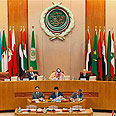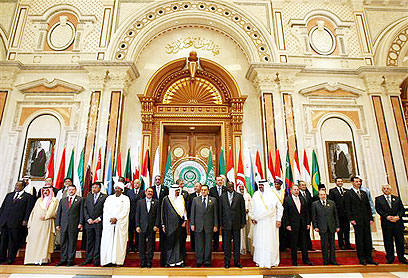
The Saudi Arabia peace initiative
None
The Saudi Arabia peace initiative, also known as the Saudi Initiative, was a plan brought forth by Abdullah ibn Abd al-Aziz al-Sa'ud, future emir of Saudi Arabia, in 2002; meant to broker a comprehensive peace between Israel and the Arab nations in the Middle East.
First mentioned in an interview given by the Saudi crown prince to the New York Times in February of 2002, his theoretic notions were soon turned into an document of principles meant to end the Israeli-Arab conflict once and for all; and to bring about a full normalization of relations – including the Arab nation's recognition in Israel – in the region.
The Arab League first discussed the Saudi Initiative in March of 2002. After days of tempestuous deliberations, the League's 22 members unanimously decided to embrace the plan, dubbing it "the Arab peace initiative." The Arab nations demanded Israel accept the initiative's outline as-is, despite the fact that it lacked any practical recourse which would allow for negotiations.
The European Union and US initially welcomed the initiative and even sought ways of turning it into a pan-Arab initiative, but Israel's reaction to it was ambivalent; since while Jerusalem welcomed the notion of peace, it objected to the Arab League's demands on Palestinian refugees' right of return.

Arab League members in Riyadh, 2007 (Photo: AP)
The gaps between the parties eventually led to the initiative's shelving, but it took center stage again in 2007, when the Arab League reaffirmed its principles in its Riyadh conference. The League then issued the following statement:
"The Council of Arab States at the Summit Level at its 14th Ordinary Session, reaffirms the resolution taken in June 1996 at the Cairo extra-ordinary Arab Summit that a just and comprehensive peace in the Middle East is the strategic option of the Arab countries, to be achieved in accordance with international legality, and which would require a comparable commitment on the part of the Israeli government.
"Having listened to the statement made by his royal highness Prince Abdullah bin Abdul Aziz, in which his highness presented his initiative calling for full Israeli withdrawal from all the Arab territories occupied since June 1967, an implementation of Security Council Resolutions 242 and 338, reaffirmed by the Madrid Conference of 1991 and the land-for-peace principle; and Israel's acceptance of an independent Palestinian state with East Jerusalem as its capital, it calls for the establishment of normal relations in the context of a comprehensive peace with Israel, emanating from the conviction of the Arab countries that a military solution to the conflict will not achieve peace or provide security for the parties, the council:
1. Requests Israel to reconsider its policies and declare that a just peace is its strategic option as well.
2. Further calls upon Israel to affirm: (I) Full Israeli withdrawal from all the territories occupied since 1967, including the Syrian Golan Heights, to the June 4, 1967 lines, as well as the remaining occupied Lebanese territories in the south of Lebanon; (II) Achievement of a just solution to the Palestinian refugee problem to be agreed upon in accordance with UN General Assembly Resolution 194; (III) The acceptance of the establishment of a sovereign independent Palestinian state on the Palestinian territories occupied since June 4, 1967 in the West Bank and Gaza Strip, with East Jerusalem as its capital.
3. Consequently, the Arab countries affirm the following: (I) Consider the Arab-Israeli conflict as ended and enter into a peace agreement with Israel, meant to provide security for all the states of the region; (II) Establish normal relations with Israel in the context of this comprehensive peace.
4. Assures the rejection of all forms of Palestinian patriation which conflict with the special circumstances of the Arab host countries.
5. Calls upon the government of Israel and all Israelis to accept this initiative in order to safeguard the prospects for peace and stop the further shedding of blood, enabling the Arab countries and Israel to live in peace and good neighborliness and provide future generations with security, stability and prosperity.
6. Invites the international community and all countries and organizations to support this initiative.
7. Requests the chairman of the summit to form a special committee composed of some of its concerned member states and the secretary general of the Arab League to pursue the necessary contacts to gain support for this initiative at all levels, particularly from the United Nations, the Security Council, the United States of America, the Russian Federation, the Muslim states and the European Union."
Following the declaration, the Arab League formed several teams featuring delegates from Israel, Egypt, Jordan and the Palestinian Authority, tasked with finding ways in which the initiative can be advanced.










